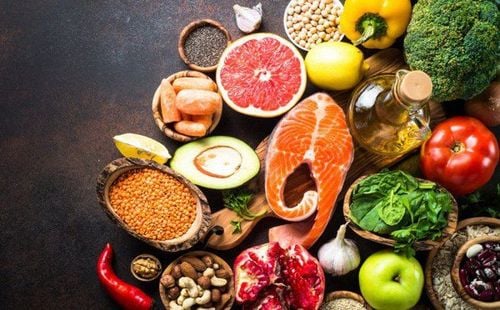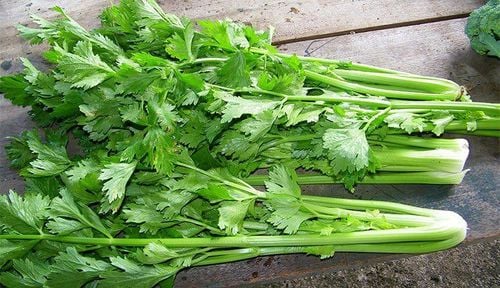This is an automatically translated article.
Celery is well known for being low in calories and for its many health benefits due to the fact that it contains useful phytonutrients, vitamins and minerals. It is a very convenient on-the-go snack as well as a vegetable that can be incorporated into cooked dishes, stir-fries and salads. So, what exactly does celery have?
1. Celery Nutrition Facts
Since celery is mainly made of water (almost 95%), the vitamin or mineral content is not high. However, according to the Food and Drug Administration (FDA), celery is a good source of vitamin K, with one cup containing about 30% of the recommended daily amount.
Celery can also help you get enough folate, potassium, fiber and molybdenum. Celery also contains small amounts of vitamin C, vitamin A, and some B vitamins, and is low in calories, carbohydrates, fat, and cholesterol.
Carbs Consumers often choose celery in their diets because this food is very low in calories and carbohydrates. One cup of chopped celery has only 3 grams of carbohydrates, more than half of which comes from fiber. In addition, celery also has 1.4 grams of natural sugar in one cup of celery.
The glycemic index of raw celery is low, at 35. However, when cooked, it will significantly increase the glycemic index of celery to a value of 85.2.
Fats Celery is naturally fat-free, with very little fatty acids.
Protein For each cup of celery is low in protein, about less than 1 gram per cup.
Vitamins and minerals In terms of nutritional composition, celery is low in calories but rich in certain micronutrients, such as potassium, folate, choline, vitamin A and vitamin K. Besides, celery It is also a good source of some natural sodium and fluoride.

Cần tây chứa 95% là nước và có lượng lớn vitamin K
2. Health Benefits of Celery
Lose weight With a nutritional composition of only about 10 calories in a stalk of celery and a cup of chopped celery contains about 16 calories. It also contains fiber (1.6 grams per cup), which helps curb cravings because celery absorbs water in the digestive tract, making you feel fuller for longer.
A recent study published in the Annals of Internal Medicine shows that simply adding more fiber to your diet can make a significant contribution to weight loss.
Anti-inflammatory Celery is one of the foods that are rich in phytonutrient antioxidants that have anti-inflammatory properties. A study in the journal Nutrition and Cancer revealed that celery was a significant source of flavonoids and flavone antioxidants in Chinese adults. In another study, published in the journal Molecular Nutrition & Food Research, researchers found that celery juice and celery extract products can help reduce mass necrosis factor activity. tumor alpha (TNF-A) and nuclear factor kappa B (NF-KB), which are both proteins implicated in inflammatory problems. Another study published in the journal Planta Medica found that the luteolin in celery can inhibit the production of COX-2, an enzyme that causes inflammation.
Cholesterol and Blood Pressure Celery's fiber can help lower cholesterol levels because it absorbs excess cholesterol compounds in the intestines and expels them during elimination.
Research on the relationship between celery and cholesterol in humans is limited, but animal studies show promising results.
Another study from the University of Chicago discovered that phthalides in celery were effective in reducing bad cholesterol levels by 7% and lowering blood pressure by 14%. Phthalides can reduce stress hormones in the blood, allowing blood vessels to widen and dilate and allowing more blood to flow through the body.
Another study, published in the Journal of Pharmacognosy, looked at the effects of celery seed extract in rats. The researchers concluded that celery has a positive effect on lowering LDL (bad) cholesterol, triglycerides and increasing the level of HDL (good cholesterol) in the body.
A human study, published in the Journal of Natural Medicine, looked at celery seed extract for patients with mild to moderate hypertension for six weeks and found a drop in blood pressure.
Digestion Fiber is well known for its digestive benefits. It helps keep your bowel movements regular, thus relieving constipation; Helps keep your intestines healthy and aids in weight maintenance. One cup of celery provides about 6% of your daily fiber needs.

Cần tây chứa lượng lớn chất xơ giúp người dùng chống táo bón hiệu quả
>>> 6 unexpected benefits of celery seeds
3. Is it good to eat a lot of celery?
Each cup of celery has about 88 milligrams of sodium, which is quite high compared to other vegetables. However, this doesn't make celery a high-sodium food for you to worry about.
Other risks of eating a lot of celery include malnutrition and stomach problems. It is especially important to note that dieters should use caution and should not abuse celery because it is very low in calories and can lead to malnutrition. And while fiber is great for you, too much can cause bloating, gas and diarrhea.
In the case of eating raw or undercooked celery in very large quantities and with constant frequency, celery can cause symptoms of nausea. This is because large amounts of uncooked celery can interfere with the action of iodine in the thyroid gland. Celery contains chemicals called psoralens, which, if applied directly to the skin, can make the skin temporarily sensitive to ultraviolet rays. This means that if you apply celery juice to your skin and go out in the sun, you may develop a rash. The rash, which may be accompanied by a burn, appears within 12 to 36 hours and lasts three to five days, although hyperpigmentation (dark skin) may persist longer.
Celery is known to be a plant that is highly exposed to pesticides. So, to be on the safe side, before using, be sure to wash the celery thoroughly or buy organic celery if possible.
Please dial HOTLINE for more information or register for an appointment HERE. Download MyVinmec app to make appointments faster and to manage your bookings easily.
Article reference source: livescience.com, healthline.com












